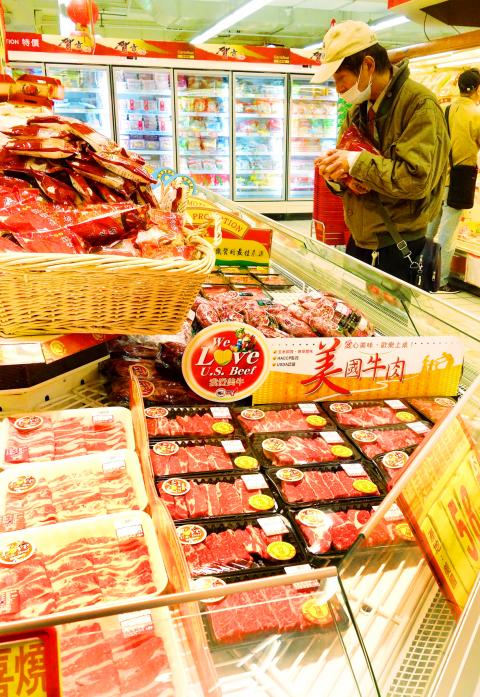The US has once again raised concerns over Taiwan’s ban on its pork and beef products, highlighting the issue in the Office of the US Trade Representative’s (USTR) 2018 Trade Policy Agenda and 2017 Annual Report, and refocusing attention on what has been an obstacle to the two nations signing a free-trade agreement.
In the annual report, the USTR underscored US concerns about Taiwan’s agricultural policies, which it said “are not based upon science.”
That refers to Taiwan’s “zero tolerance” policy on US pork imports containing the leanness-enhancing feed additive ractopamine that was adopted due to lingering concerns about the drug’s safety and strong opposition from local pig farmers.

Photo: Peter Lo, Taipei Times
One of the main priorities for the US in its trade with Taiwan is to remove “Taiwan’s barriers to US pork products and certain US beef products produced using ractopamine,” the report said.
The use of the feed additive is authorized in the US by the US Food and Drug Administration, with about 60 percent to 80 percent of all US pigs fed ractopamine, which explains Washington’s eagerness to eliminate the ban.
While Taiwan has not amended its ban on ractopamine in pork products, which has been in effect since 2006, it relented on its ban of the chemical in beef products in 2012, allowing imports with a maximum residue level of 10 parts per billion.
Ractopamine remains banned in all 27 EU member states, China and Russia.
Another priority for the US is to remove “other barriers to US beef offal products” in Taiwan, the report said.
On the subject of agricultural policy, the report said the US is also focused on Taiwan’s rice procurement systems, restrictions on potatoes with greening, its regulatory process for setting maximum pesticide residue limits, and market access barriers facing US agricultural biotechnology products and certified US organic products.
The report indicated that the US would continue to work under the US-Taiwan Trade and Investment Framework Agreement and through the WTO to address the issues, which are important to US stakeholders.

DAREDEVIL: Honnold said it had always been a dream of his to climb Taipei 101, while a Netflix producer said the skyscraper was ‘a real icon of this country’ US climber Alex Honnold yesterday took on Taiwan’s tallest building, becoming the first person to scale Taipei 101 without a rope, harness or safety net. Hundreds of spectators gathered at the base of the 101-story skyscraper to watch Honnold, 40, embark on his daredevil feat, which was also broadcast live on Netflix. Dressed in a red T-shirt and yellow custom-made climbing shoes, Honnold swiftly moved up the southeast face of the glass and steel building. At one point, he stepped onto a platform midway up to wave down at fans and onlookers who were taking photos. People watching from inside

A Vietnamese migrant worker yesterday won NT$12 million (US$379,627) on a Lunar New Year scratch card in Kaohsiung as part of Taiwan Lottery Co’s (台灣彩券) “NT$12 Million Grand Fortune” (1200萬大吉利) game. The man was the first top-prize winner of the new game launched on Jan. 6 to mark the Lunar New Year. Three Vietnamese migrant workers visited a Taiwan Lottery shop on Xinyue Street in Kaohsiung’s Gangshan District (崗山), a store representative said. The player bought multiple tickets and, after winning nothing, held the final lottery ticket in one hand and rubbed the store’s statue of the Maitreya Buddha’s belly with the other,

‘COMMITTED TO DETERRENCE’: Washington would stand by its allies, but it can only help as much as countries help themselves, Raymond Greene said The US is committed to deterrence in the first island chain, but it should not bear the burden alone, as “freedom is not free,” American Institute in Taiwan Director Raymond Greene said in a speech at the Institute for National Defense and Security Research’s “Strengthening Resilience: Defense as the Engine of Development” seminar in Taipei yesterday. In the speech, titled “Investing Together and a Secure and Prosperous Future,” Greene highlighted the contributions of US President Donald Trump’s administration to Taiwan’s defense efforts, including the establishment of supply chains for drones and autonomous systems, offers of security assistance and the expansion of

STREAMLINED: The dedicated funding would allow the US to transfer equipment to Taiwan when needed and order upgraded replacements for stockpiles, a source said The US House of Representatives on Thursday passed a defense appropriations bill totaling US$838.7 billion, of which US$1 billion is to be allocated to reinforcing security cooperation with Taiwan and US$150 million to replace defense articles provided to the nation. These are part of the Consolidated Appropriation Act, which the US House yesterday passed with 341 votes in favor and 88 against. The act must be passed by the US Senate before Friday next week to avoid another government shutdown. The US House Committee on Appropriations on Monday unveiled the act, saying that it allocates US$1 billion for the Taiwan Security Cooperation Initiative